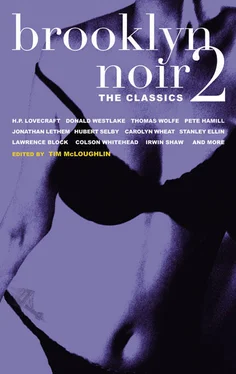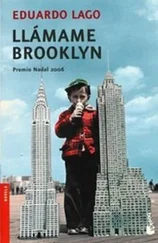H. Lovecraft - Brooklyn Noir 2
Здесь есть возможность читать онлайн «H. Lovecraft - Brooklyn Noir 2» весь текст электронной книги совершенно бесплатно (целиком полную версию без сокращений). В некоторых случаях можно слушать аудио, скачать через торрент в формате fb2 и присутствует краткое содержание. Год выпуска: 2005, ISBN: 2005, Издательство: Akashic Books, Жанр: Детектив, на английском языке. Описание произведения, (предисловие) а так же отзывы посетителей доступны на портале библиотеки ЛибКат.
- Название:Brooklyn Noir 2
- Автор:
- Издательство:Akashic Books
- Жанр:
- Год:2005
- ISBN:978-1888451764
- Рейтинг книги:4 / 5. Голосов: 1
-
Избранное:Добавить в избранное
- Отзывы:
-
Ваша оценка:
- 80
- 1
- 2
- 3
- 4
- 5
Brooklyn Noir 2: краткое содержание, описание и аннотация
Предлагаем к чтению аннотацию, описание, краткое содержание или предисловие (зависит от того, что написал сам автор книги «Brooklyn Noir 2»). Если вы не нашли необходимую информацию о книге — напишите в комментариях, мы постараемся отыскать её.
Brooklyn Noir 2 — читать онлайн бесплатно полную книгу (весь текст) целиком
Ниже представлен текст книги, разбитый по страницам. Система сохранения места последней прочитанной страницы, позволяет с удобством читать онлайн бесплатно книгу «Brooklyn Noir 2», без необходимости каждый раз заново искать на чём Вы остановились. Поставьте закладку, и сможете в любой момент перейти на страницу, на которой закончили чтение.
Интервал:
Закладка:
Crawley drove their car, an unmarked ’56 Chevy, while Levine sat beside him and worried about death. At least this would be one of the neat ones. No knives or bombs or broken beer bottles. Just poison, that was all. The victim would look as though he were sleeping, unless it had been one of those poisons causing muscle spasms before death. But it would still be neater than a knife or a bomb or a broken beer bottle, and the victim wouldn’t look quite so completely dead.
Crawley drove leisurely, without the siren. He was a big man in his forties, somewhat overweight, square-faced and heavy jowled, and he looked meaner than he actually was. The Chevy tooled up Eighth Avenue, the late spring sun shining on its hood. They were headed for an address on Garfield Place, the block between Eighth Avenue and Prospect Park West. They had to circle the block, because Garfield was a one-way street. That particular block on Garfield Place is a double row of chipped brownstones, the street running down between two rows of high stone stoops, the buildings cut and chopped inside into thousands of apartments, crannies and cubbyholes, niches and box-like caves, where the subway riders sleep at night. The subway to Manhattan is six blocks away, up at Grand Army Plaza, across the way from the main library.
At one p.m. on this Wednesday in late May, the sidewalks were deserted, the buildings had the look of long abandoned dwellings. Only the cars parked along the left side of the street indicated present occupancy.
The number they wanted was in the middle of the block, on the right-hand side. There was no parking allowed on that side, so there was room directly in front of the address for Crawley to stop the Chevy. He flipped the sun visor down, with the official business card showing through the windshield, and followed Levine across the sidewalk and down the two steps to the basement door, under the stoop. The door was propped open with a battered garbage can. Levine and Crawley walked inside. It was dim in there, after the bright sunlight, and it took Levine’s eyes a few seconds to get used to the change. Then he made out the figures of two men standing at the other end of the hallway, in front of a closed door. One was the patrolman, Tanner, young, just over six foot, with a square and impersonal face. The other was Larry Perkins.
Levine and Crawley moved down the hallway to the two men waiting for them. In the seven years they had been partners, they had established a division of labor that satisfied them both. Crawley asked the questions, and Levine listened to the answers. Now, Crawley introduced himself to Tanner, who said, “This is Larry Perkins of 294 Fourth Street.”
“Body in there?” asked Crawley, pointing at the closed door.
“Yes, sir,” said Tanner.
“Let’s go inside,” said Crawley. “You keep an eye on the pigeon. See he doesn’t fly away.”
“I’ve got some stuff to go to the library,” said Perkins suddenly. His voice was young and soft.
They stared at him. Crawley said, “It’ll keep.”
Levine looked at Perkins, trying to get to know him. It was a technique he used, most of it unconsciously. First, he tried to fit Perkins into a type or category, some sort of general stereotype. Then he would look for small and individual ways in which Perkins differed from the general type, and he would probably wind up with a surprisingly complete mental picture, which would also be surprisingly accurate.
The general stereotype was easy. Perkins, in his black wool sweater and belt-in-the-back khakis and scuffed brown loafers without socks, was “arty.” What were they calling them this year? They were “hip” last year, but this year they were “beat.” That was it. For a general stereotype, Larry Perkins was a beatnik. The individual differences would show up soon, in Perkins’s talk and mannerisms and attitudes.
Crawley said again, “Let’s go inside,” and the four of them trooped into the room where the corpse lay.
The apartment was one large room, plus a closet-size kitchenette and an even smaller bathroom. A Murphy bed stood open, covered with zebra-striped material. The rest of the furniture consisted of a battered dresser, a couple of armchairs and lamps, and a record player sitting on a table beside a huge stack of longplaying records. Everything except the record player looked faded and worn and second-hand, including the thin maroon rug on the floor and the soiled flower-pattern wallpaper. Two windows looked out on a narrow cement enclosure and the back of another brownstone. It was a sunny day outside, but no sun managed to get down into this room.
In the middle of the room stood a card table, with a typewriter and two stacks of paper on it. Before the card table was a folding chair, and in the chair sat the dead man. He was slumped forward, his arms flung out and crumpling the stacks of paper, his head resting on the typewriter. His face was turned toward the door, and his eyes were closed, his facial muscles relaxed. It had been a peaceful death, at least, and Levine was grateful for that.
Crawley looked at the body, grunted, and turned to Perkins. “Okay,” he said. “Tell us about it.”
“I put the poison in his beer,” said Perkins simply. He didn’t talk like a beatnik at any rate. “He asked me to open a can of beer for him. When I poured it into a glass, I put the poison in, too. When he was dead, I went and talked to the patrolman here.”
“And that’s all there was to it?”
“That’s all.”
Levine asked, “Why did you kill him?”
Perkins looked over at Levine. “Because he was a pompous ass.”
“Look at me,” Crawley told him.
Perkins immediately looked away from Levine, but before he did so, Levine caught a flicker of emotion in the boy’s eyes, what emotion he couldn’t tell. Levine glanced around the room, at the faded furniture and the card table and the body, and at young Perkins, dressed like a beatnik but talking like the politest of polite young men, outwardly calm but hiding some strong emotion inside his eyes. What was it Levine had seen there? Terror? Rage? Or pleading?
“Tell us about this guy,” said Crawley, motioning at the body. “His name, where you knew him from, the whole thing.”
“His name is Al Gruber. He got out of the Army about eight months ago. He’s living on his savings and the GI Bill. I mean, he was .”
“He was a college student?”
“More or less. He was taking a few courses at Columbia, nights. He wasn’t a full-time student.”
Crawley said, “What was he, full-time?”
Perkins shrugged. “Not much of anything. A writer. An undiscovered writer. Like me.”
Levine asked, “Did he make much money from his writing?”
“None,” said Perkins. This time he didn’t turn to look at Levine, but kept watching Crawley while he answered. “He got something accepted by one of the quarterlies once,” he said, “but I don’t think they ever published it. And they don’t pay anything anyway.”
“So he was broke?” asked Crawley.
“Very broke. I know the feeling well.”
“You in the same boat?”
“Same life story completely,” said Perkins. He glanced at the body of Al Gruber and said, “Well, almost. I write, too. And I don’t get any money for it. And I’m living on the GI Bill and savings and a few home-typing jobs, and going to Columbia nights.”
People came into the room then, the medical examiner and the boys from the lab, and Levine and Crawley, bracketing Perkins between them, waited and watched for a while. When they could see that the M.E. had completed his first examination, they left Perkins in Tanner’s charge and went over to talk to him.
Crawley, as usual, asked the questions. “Hi, Doc,” he said. “What’s it look like to you?”
Читать дальшеИнтервал:
Закладка:
Похожие книги на «Brooklyn Noir 2»
Представляем Вашему вниманию похожие книги на «Brooklyn Noir 2» списком для выбора. Мы отобрали схожую по названию и смыслу литературу в надежде предоставить читателям больше вариантов отыскать новые, интересные, ещё непрочитанные произведения.
Обсуждение, отзывы о книге «Brooklyn Noir 2» и просто собственные мнения читателей. Оставьте ваши комментарии, напишите, что Вы думаете о произведении, его смысле или главных героях. Укажите что конкретно понравилось, а что нет, и почему Вы так считаете.












